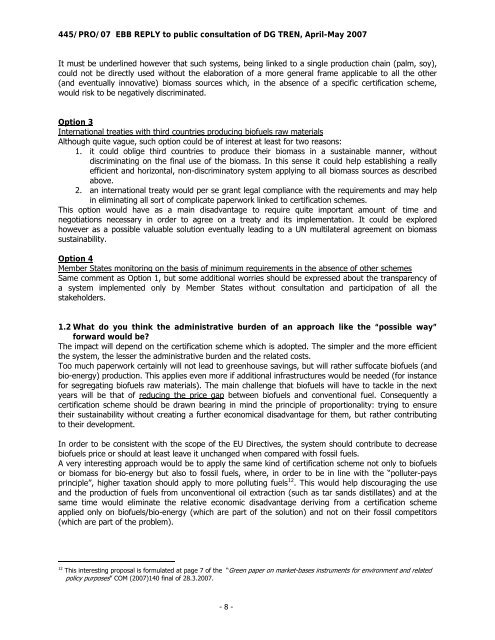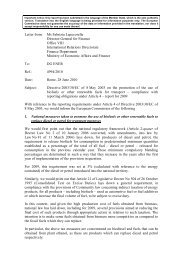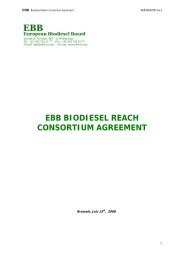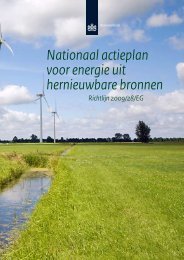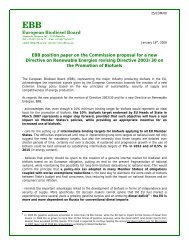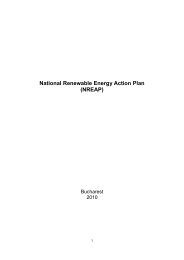EBB - European Biodiesel Board
EBB - European Biodiesel Board
EBB - European Biodiesel Board
Create successful ePaper yourself
Turn your PDF publications into a flip-book with our unique Google optimized e-Paper software.
445/PRO/07 <strong>EBB</strong> REPLY to public consultation of DG TREN, April-May 2007<br />
It must be underlined however that such systems, being linked to a single production chain (palm, soy),<br />
could not be directly used without the elaboration of a more general frame applicable to all the other<br />
(and eventually innovative) biomass sources which, in the absence of a specific certification scheme,<br />
would risk to be negatively discriminated.<br />
Option 3<br />
International treaties with third countries producing biofuels raw materials<br />
Although quite vague, such option could be of interest at least for two reasons:<br />
1. it could oblige third countries to produce their biomass in a sustainable manner, without<br />
discriminating on the final use of the biomass. In this sense it could help establishing a really<br />
efficient and horizontal, non-discriminatory system applying to all biomass sources as described<br />
above.<br />
2. an international treaty would per se grant legal compliance with the requirements and may help<br />
in eliminating all sort of complicate paperwork linked to certification schemes.<br />
This option would have as a main disadvantage to require quite important amount of time and<br />
negotiations necessary in order to agree on a treaty and its implementation. It could be explored<br />
however as a possible valuable solution eventually leading to a UN multilateral agreement on biomass<br />
sustainability.<br />
Option 4<br />
Member States monitoring on the basis of minimum requirements in the absence of other schemes<br />
Same comment as Option 1, but some additional worries should be expressed about the transparency of<br />
a system implemented only by Member States without consultation and participation of all the<br />
stakeholders.<br />
1.2 What do you think the administrative burden of an approach like the “possible way”<br />
forward would be?<br />
The impact will depend on the certification scheme which is adopted. The simpler and the more efficient<br />
the system, the lesser the administrative burden and the related costs.<br />
Too much paperwork certainly will not lead to greenhouse savings, but will rather suffocate biofuels (and<br />
bio-energy) production. This applies even more if additional infrastructures would be needed (for instance<br />
for segregating biofuels raw materials). The main challenge that biofuels will have to tackle in the next<br />
years will be that of reducing the price gap between biofuels and conventional fuel. Consequently a<br />
certification scheme should be drawn bearing in mind the principle of proportionality: trying to ensure<br />
their sustainability without creating a further economical disadvantage for them, but rather contributing<br />
to their development.<br />
In order to be consistent with the scope of the EU Directives, the system should contribute to decrease<br />
biofuels price or should at least leave it unchanged when compared with fossil fuels.<br />
A very interesting approach would be to apply the same kind of certification scheme not only to biofuels<br />
or biomass for bio-energy but also to fossil fuels, where, in order to be in line with the “polluter-pays<br />
principle”, higher taxation should apply to more polluting fuels 12 . This would help discouraging the use<br />
and the production of fuels from unconventional oil extraction (such as tar sands distillates) and at the<br />
same time would eliminate the relative economic disadvantage deriving from a certification scheme<br />
applied only on biofuels/bio-energy (which are part of the solution) and not on their fossil competitors<br />
(which are part of the problem).<br />
12 This interesting proposal is formulated at page 7 of the “Green paper on market-bases instruments for environment and related<br />
policy purposes” COM (2007)140 final of 28.3.2007.<br />
- 8 -


